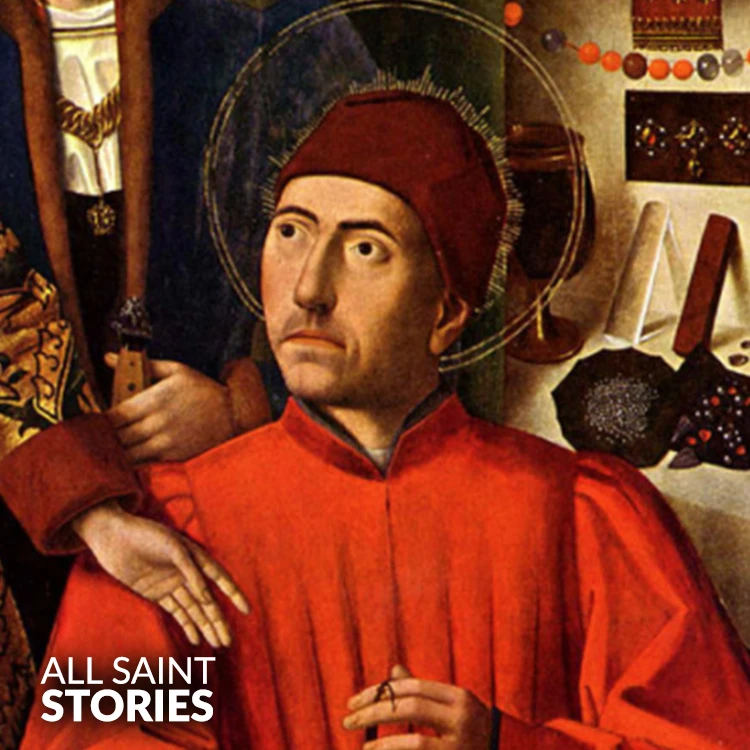St. Eligius, noble and holy servant of God, you worked tirelessly to serve the poor and needy, and used your gifts to glorify God. Intercede for us, that we may follow your example of charity, humility, and dedication in our daily lives. Help us to honor God through our work, and to always act with love and kindness toward others. Pray for us, St. Eligius, that we may be granted strength, grace, and peace. Amen.
ST. ELUGIUS (BISHOP)
ST. ELUGIUS (BISHOP)

Saint Eligius, a 7th-century bishop and goldsmith, is known for his piety, charity, and work in spreading Christianity. He was a counselor to kings, founded monasteries, and was known for his commitment to helping the poor. His feast day is celebrated on December 1.
Saint Eligius was born around 588 in what is now the region of modern-day Belgium or northern France. Initially, Eligius worked as a goldsmith, a highly respected profession in his time, and his skills made him renowned. However, his life took a significant turn when he converted to Christianity and dedicated himself to serving God.
Eligius was deeply inspired by his Christian faith and began using his wealth and influence to help others. He became a close advisor to Clotaire II, King of the Franks, and his skills as a craftsman and advisor helped him earn the trust of the royal court. Eligius was well known for his charity, especially his care for the poor and the oppressed. He used his position to secure lands and resources to establish churches, hospitals, and monasteries, particularly in the regions around Noyon and Paris.
In 641, Eligius was appointed bishop of Noyon and Tournai, where he continued to serve the Church with great dedication. As a bishop, he was known for his pastoral care and efforts to spread Christianity throughout his diocese. He was a strong advocate for the poor and marginalized, frequently helping to alleviate their suffering through acts of charity.
Eligius is also credited with founding several monasteries, which became centers of learning and Christian life in his time. He was deeply committed to promoting the faith and was instrumental in the Christianization of the region, working tirelessly to convert the pagan population and strengthen the Church’s presence.
Saint Eligius was known for his miracles, particularly in the areas of healing and prophecy. His deep spirituality and commitment to God made him a beloved figure in his time. He passed away on December 1, 660, and was buried in the cathedral at Noyon, which later became an important pilgrimage site. His relics are said to have been preserved there.
His legacy endures, particularly in his strong advocacy for the poor and his commitment to building up the Church. He was canonized as a saint and is venerated as the patron saint of goldsmiths, metalworkers, and coin collectors. His feast day is celebrated on December 1, the day of his death.
Saint Eligius is also remembered for his role in the development of early Christian monasticism and his dedication to spreading Christianity through both his religious leadership and his acts of charity. His life serves as a powerful example of humility, service to others, and dedication to the faith.
Video Not Found
No images uploaded for this saint yet.
The information on this website is compiled from various trusted sources. While we aim for accuracy, some details may be incomplete or contain discrepancies.
If you notice any errors or have additional information about this saint, please use the form on the left to share your suggestions. Your input helps us improve and maintain reliable content for everyone.
All submissions are reviewed carefully, and your personal details will remain confidential. Thank you for contributing to the accuracy and value of this resource.
Credits & Acknowledgments
- Anudina Visudhar (Malayalam) – Life of Saints for Everyday
by Msgr. Thomas Moothedan, M.A., D.D. - Saint Companions for Each Day
by A. J. M. Mausolfe & J. K. Mausolfe - US Catholic (Faith in Real Life) – Informational articles
- Wikipedia – General reference content and images
- Anastpaul.com – Saint images and reflections
- Pravachaka Sabdam (Malayalam) – Saint-related content and insights
We sincerely thank these authors and platforms for their valuable contributions. If we have unintentionally missed any attribution, please notify us, and we will make the correction promptly.
If you have any suggestion about ST. ELUGIUS (BISHOP)
Your suggestion will help improve the information about this saint. Your details will not be disclosed anywhere.
© 2026 Copyright @ www.allsaintstories.com


 English
English
 Italian
Italian
 French
French
 Spanish
Spanish
 Malayalam
Malayalam
 Russian
Russian
 Korean
Korean
 Sinhala
Sinhala
 Japanese
Japanese
 Arabic
Arabic
 Portuguese
Portuguese
 Bantu
Bantu
 Greek
Greek
 German
German
 Dutch
Dutch
 Filipino
Filipino